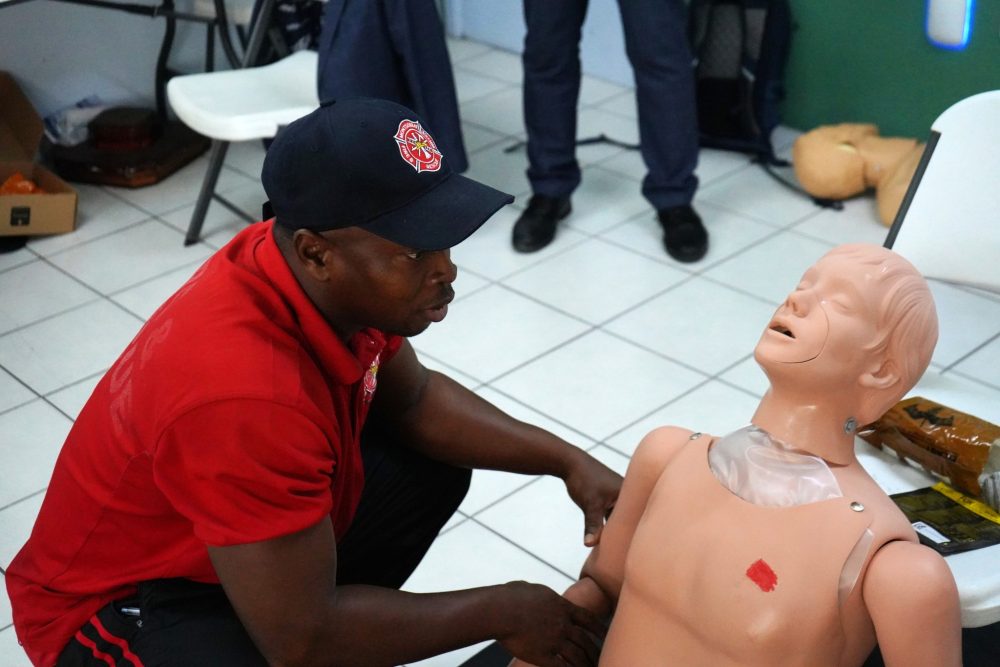BRADES, Montserrat – Online safety of our children should be an extension of the principles and values we use in daily life, says Denzil West, Director of the Government of Montserrat’s Department of Information Technology and eGovernment Services (DITES).
Raising Children in an ICT-Driven World was the topic of Wednesday’s After Work Chat led by West, who is also a member of the National ICT Council, the host of the ICT Week activities, which began on Monday November 10, 2014.
“Safety in the online world is not much different from the “real” world. The digital world is a new way for our children to be exposed to danger,” he told the group gathered at The Lyme. “What is different is the ubiquitous nature where they are connected to multiple devices everywhere you turn.”
Now that homes have gone from one computer in a central space where parents could keep an eye on what children were doing, to laptops, tablets, and smartphones which children can take to their bedrooms, it is important that parents have an agreement on how the devices are to be used, suggested the speaker.
“We still need to be able to tell our children to put down the tablet or phone. We can’t blame the technology when we are the ones who allow them access to it. Parents must be involved in what they are doing,” said the father of three. “Make internet time about family, discovery and interaction.”
The director said what they recognized with the introduction of the secondary school’s laptop programme in 2012 was that the parents didn’t understand the technology and so students were able to take hold of the computer, get administration access and block their parents from using it.
West encouraged the group to force themselves and to push parents and teachers to understand the technology so they could have control of it. “When we asked for parents to pay a portion of the cost of the laptop it was so they had a stake in it and would claim ownership of it.”
He added that with the advent of social media, parents need to know who their children’s online friends are, recognize it is possible to be cyberbullied and what that means, and have clear rules as to how they are to behave online and when they have access. “Just as in the past your parents had to know who the parents of your friends were, it is still necessary in the virtual world.”
West shared several templates of online contracts which parents can use as the basis of agreements with their children to define the rules of their behavior on the internet. “At what age do you give your child free access and no longer need to know their passwords? What are they allowed to post online? Children must be aware that not only shouldn’t they post nude or other compromising photos online but that with geotagging, it is possible for someone to find out exactly where they live and become a real danger to them.”
The expert said the new modems with integrated wifi routers now offer parental controls which can be enabled to filter and block children from accessing certain websites and setting cut off times when their devices will no longer have internet access. “Every device has a unique identifier called a MAC Address and so without taking the device away from your child before bed at night, you can control how long and what they can access on the internet.”
West said it was important that parents have solid relationships with their children offline in order for the same practices to be extended into a digital world.
Dr. Samuel Joseph reflected for children today there is no longer a difference between what is the digital and offline world, and it was critical they recognize that whatever goes on the internet stays on the internet.
Youth Officer Loni Howe agreed, noting that employers on island were now using the internet and Facebook to check whether they wanted to hire a young person and negative online behavior was now playing a major role in whether they were able to get a job.
The audience was admonished to find out where their children went online and to understand the technology so they wouldn’t be bamboozled.
This is the first year that the National ICT Council in partnership with the Ministry of Communications & Works is hosting ICT Week. Activities close out on Friday, November 14 with the school poster competition.
Discover more from Discover Montserrat
Subscribe to get the latest posts sent to your email.



